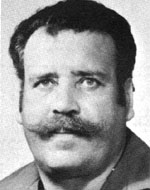Tamim, Nissim
Son of Victor and Fortuna. He was born in Tunis on April 4, 1935, where he acquired a good command of Arabic and French, and in 1951 immigrated to Israel, where he worked as a shoemaker, Nissim was drafted into the IDF in early February 1953. After basic training he underwent a driving course and was assigned to the unit as a driver. His commanders greatly appreciated his work and opinion prior to his discharge from regular service. His commanders wrote that he was an excellent driver who fulfilled every task efficiently and thoroughly. Therefore, the commanders also spoke of his Lev to join the career army. Nissim decided to finish his regular service and immediately enlisted in the Border Police and later in the Israel Police. A few years later he took off his uniform and tried his luck in civilian life as a taxi driver. Nissim married and they had two daughters. The marriage did not work out – and they divorced. In March 1969, he married his girlfriend, Rachel, and together they established a warm and loving home where seven children grew up – Smadar, Chaya, Orna, Yahalomit, Sigal, Aharon and Shlomo. In 1967, Nissim joined the career army and served as a heavy truck driver in the Transportation Corps. He did his job well. Was awarded the rank of First Sergeant, and was promoted to the rank of First Sergeant, and his commanders loved him very much and appreciated him as a man and as a soldier, for which he was awarded the ‘Six Day War.’ and was in the Yom Kippur War and was awarded the ‘Yom Kippur War’, after which he was one of the founders of the Danover transport base in the Golan Heights and continued his work there until the day of his death. He was laid to rest in the military cemetery in Haifa. He left behind a wife, seven sons and daughters, two brothers and two sisters. In a letter of consolation to the widow, the unit commander wrote: “The pain and the hardship we lost, as members of the service, but even more so the pain for you and your children was so devoted. We – commanders as soldiers – are ordered to continue his activities. “
